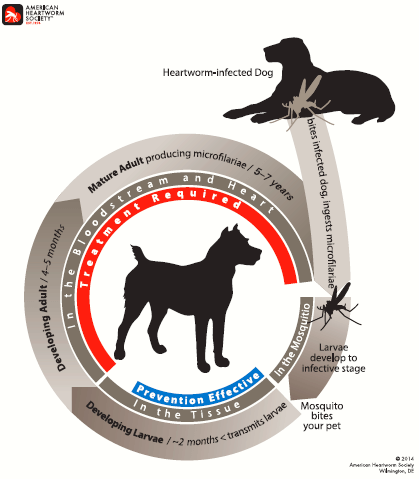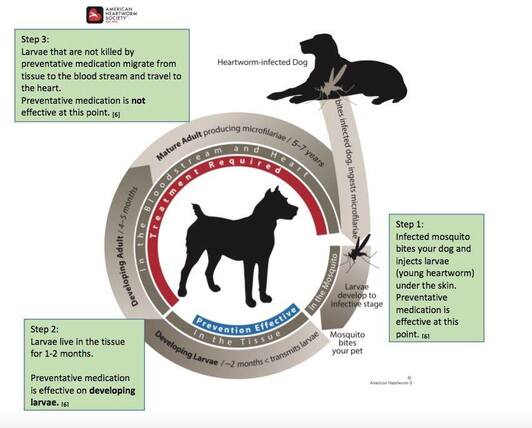HEARTWORM PREVENTION
Mac Animal Clinic Heartworm Prevention Protocol
Annual Blood Parasite Testing
Heartworm Preventative treatment from a minimum of June 1 until November 1
Did you know? Your dog's annual heartworm testing and yearly heartworm medication is included in our Pet Health Plan.
Heartworm disease is a serious and potentially fatal disease caused by worms that live in the heart, lungs and associated blood vessels of affected pets. This causes severe lung disease, heart failure and damage to other organs in the body. Preventative medication prevents the worms from growing in the circulatory system.

Heartworm is transmitted by mosquitoes. In Ontario transmission season typically begins around June 1 until November 1. Dogs that are fortunate enough to vacation down south during winter should be treated all year round.
Heartworm preventative medication comes in chewable tablets or spot on applications which often have additional flea, tick and intestinal parasite coverage as well.
Some of you may have noticed some mosquitos starting to appear as early as April. The start of mosquito season doesn’t indicate the start of risk, because the development of heart worm is temperature dependent. Therefore, even though we are seeing some mosquitoes, because we are not hitting consistent warm days there is minimal risk of infectious mosquitoes until later in the season. This combined with the fact that there is a reach back period for heart worm medication (meaning the medication kills any potential larvae from the month before), the target is to have them started within a month of hitting the heart worm development unit threshold. Which in this climate is early June.

While preventative medication is highly effective it is not 100% effective. Don’t forget, life happens, your dog may spit out a tablet, or the medication may wear off early (for example if your dog is an avid swimmer).
Due to the serious nature of heartworm disease, early detection is crucial to increase your pet’s chance of recovery. There are very few early signs of the disease, for this reason the heartworm test is extremely important as it works by detecting the presence of heartworm proteins in the blood stream.
At Mac Animal Clinic, our blood parasite test screens for six vector borne diseases. Heartworm, Lyme disease, two species of Ehrilichia (Ehrlichiosis) and two species of Anaplasma (Anaplasmosis). This is the only test that allows us to efficiently test for heartworm disease and all tick-transmitted pathogens as recommended by the Companion Animal Parasite Council.
We advise annual testing to ensure your prevention program is working and to allow early detection of a potentially fatal disease.
Heartworm is present in Southern Ontario. The number of infected mosquitos appears to be increasing due to climate change and an increased amount of travelling dogs.
Did you know that if there is a heartworm-positive dog within a mile and a half, your pet is at risk because mosquitoes can travel that far? This means that the higher prevalence of heartworm-infected dogs in a region, the higher the risk of transmission to other dogs in that area. Wildlife such as coyotes, wolves and foxes are also susceptible to heartworm infection and can act as potential reservoirs of infections for pets.

Preventive medication is effective on heartworm larvae until they migrate from the tissue to the blood stream. At this point, treatment for adult heartworms is required.
The treatment for heartworm infection involves significant medical therapy including an anti-parasitic to kill adult worms, antibiotics to treat the release of bacteria from the heartworm and steroids to minimize the risk of anaphylactic shock. This is not a benign treatment.
Street Address : 1026 Speers Road
City : Oakville
State / Province : Ontario
Postal / Zip Code : L6L 2X4
HOURS
Monday: 9:00 am - 6:00 pm
Tuesday: 9:00 am - 6:00 pm
Wednesday: 9:00 am - 7:00 pm
Thursday: 9:00 am - 5:00 pm
Friday: 9:00 am - 5:00 pm
Saturday: Closed
Sunday: Closed
SERVICES
© Copyright 2024 - All Rights Reserved - Mac Animal Clinic | Cancellation Policy | MyPortal™

